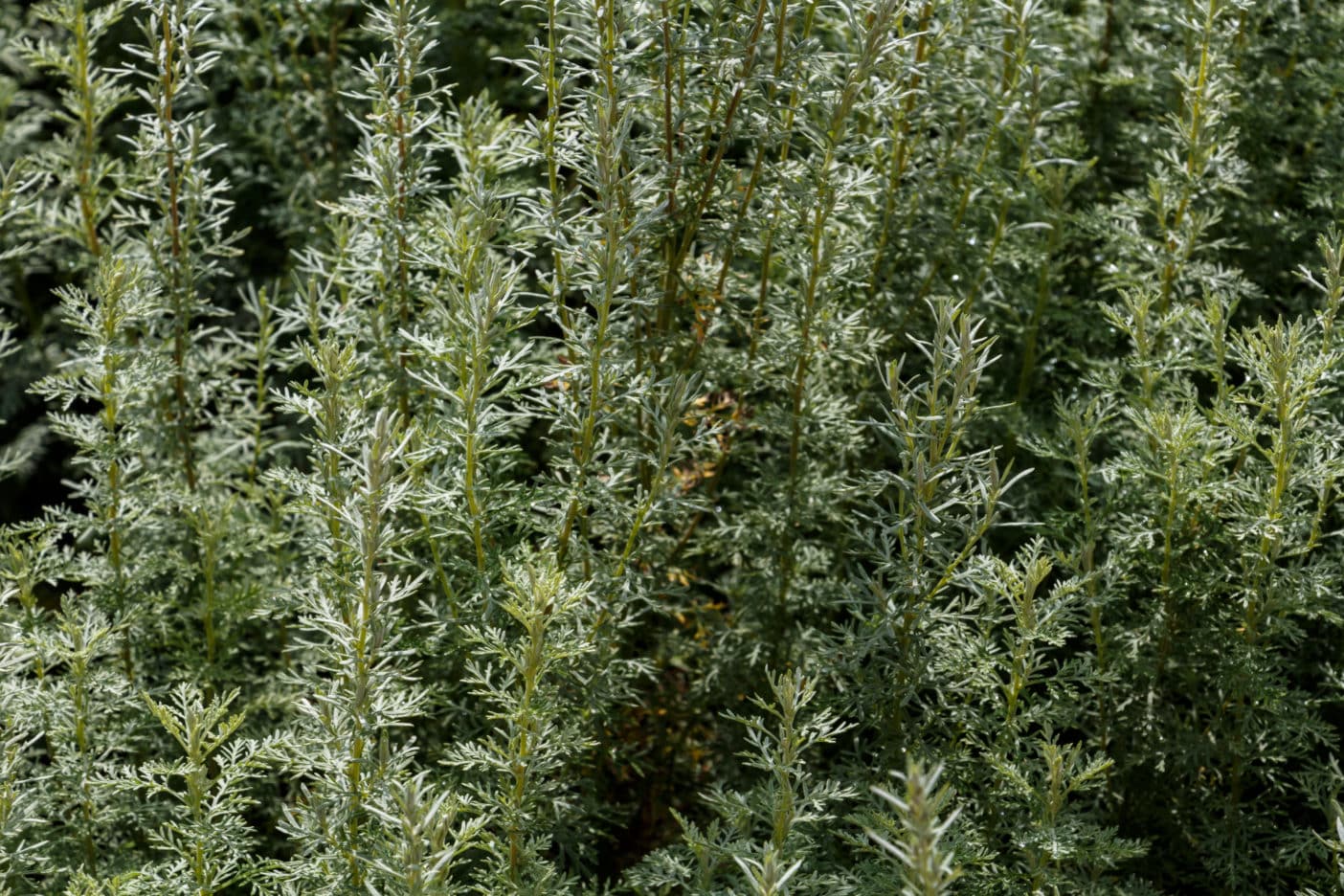Davana

Davana (Artemisia pallens) is a pretty little plant with delicate yellow flower heads and silvery-gray leaves that can grow about 60 centimeters tall. It belongs to the daisy family. Davana is also known as pale-leaved mugwort and is native mainly to the southern parts of India. The plant is botanically related to wormwood and tarragon and is the favorite food of the larvae of numerous exotic butterfly species. No wonder: the leaves and flowers beguile with a wonderfully aromatic scent and thus virtually invite the larvae to nibble. But we humans also appreciate this graceful plant: The davana oil obtained from it by steam distillation is one of the most precious flower oils of all. The warm and deep fragrance is reminiscent of a mixture of honey and mango and transports us to tropical regions. In addition, the essential oil is particularly rich in sesquiterpene ketones. In India, the flowers of the davana herb are traditionally offered to the god Shiva by decorating countless altars. The either fresh or dried leaves and stems, on the other hand, are a popular addition to bouquets, arrangements, and garlands. In Indian folk medicine, davana oil is also commonly used to treat diabetes.
Properties and uses
The main ingredient in davana oil is davanone, which makes up about 65 percent. Geraniol, linalool, and limonene are also present in smaller concentrations. Several health-relevant properties are attributed to the ingredients. For example, essential davana oil is said to have an expectorant effect, which is why it can be used as a rub or oil bath for spastic coughs. Those who often suffer from cold extremities (for example, cold feet), find rubs with davana oil due to the circulation-promoting and thus warming effect as very pleasant. A full bath with the oil gives above all in the cold season comfort and well-being. In addition, davana oil also has epithelializing properties, which means that it is useful in the care of annoying and painful scars. An abdominal massage with one drop of davana oil to 50 milliliters of base oil is even said to be able to relieve menstrual cramps, as it relieves cramps.
There are some studies that have examined the anti-inflammatory properties of davana oil. A 2017 study examined the effect of davana oil on inflammatory processes in human cells. The results showed that davana oil reduced the production of inflammatory mediators such as TNF-alpha and interleukin-6.
Davana oil in cosmetics
The oil plays an important role in aromatherapy. Here it is used specifically as a soul uplifting, emotionally balancing or calming oil. Whether in the fragrance lamp, as a massage oil or as an oil bath, davana oil can achieve very good results in stress-related complaints, exhaustion, and anxiety, which are highly appreciated by menopausal women, among others. In perfumery, davana oil is a common ingredient in chypre and fougere fragrances, especially since it has a particularly fascinating property in this area. Namely, it is said that davana oil never smells quite the same on the skin, but that it also develops slightly different nuances in different people. Therefore, the oil is very popular with perfumers, because it allows them to create unique and absolutely individual fragrances. Basically, however, it harmonizes best with floral and/or woody notes. Examples are jasmine, sandalwood, rose, bergamot and tonka. Also unmistakable is the raisin note, which is accompanied by delicate fruit and berry nuances and has a subtle mossy undertone.
Davana oil, however, is not only an excellent fragrance and massage oil and a refined ingredient in perfumes, but also lends itself very well to luxurious lotions and creams. Shower gels, soaps, lip scrubs and bath bombs are also given a sensual appeal with davana oil, which is especially popular with women due to its “feminine” character. Many also describe the oil’s scent as seductive and devotional. It evokes visions of endless dream beaches, lush green rainforests and the turquoise sea.
In cosmetics, davana oil is often used in skin care products because it has anti-inflammatory and antibacterial properties and can help soothe and heal the skin. It can also be used in hair care products to strengthen and condition hair.
Davana oil is generally very strong and should only be used in weak concentrations, especially in cosmetics.
Children, pregnant women and patients with liver disease should not use it.
Due to some substances contained, such as geraniol, limonene and linalool, an allergic potential cannot be ruled out. In addition, the oil is suspected of having an abortive effect.
Cosmacon offers the cosmetic service with individual formulation development for more than 10 years. Surely, we can help your product to be successful.
Fact Sheet Davana
INCI: Artemisia Pallens Flower Oil
CAS number: 91844-86-9
EINECS number: 295-155-6
Extraction: by steam distillation
Plant part used: flowers and leaves
Description: a viscous, golden-orange to brown liquid with fragrances of dried fruits and honey
Ingredients: davanone, linalool, limonene, geraniol
Davana oil in high quality cosmetics
Davana is an essential oil extracted from the leaves and stems of the davana plant and is widely used in aromatherapy and perfumery. Thanks to its unique warm fragrance, the oil of the davana herb is an ingredient as noble as it is feminine for sophisticated cosmetics such as bath additives, soaps, lotions, and massage oils. Cosmacon is happy to support you in the development of appropriate formulations and products.
Sources:
Artemisia pallens: An Indian Plant with Multifarious Pharmacological Potentials.; Dongare, S. Int J Med Phar Sci| 2022 12(02), 1.
Studies on aerial parts of Artemisia pallens wall for phenol, flavonoid and evaluation of antioxidant activity.; Ruikar AD, Khatiwora E, Ghayal NA, Misar AV, Mujumdar AM, Puranik VG, Deshpande NR.J Pharm Bioallied Sci. 2011 Apr;3(2):302-5.
Influence of growth stage on essential oil content and major chemical constituents of Artemisia pallens Bess.; Hiremath, C., Yadav, M. K., Swamy Gowda, M. R., Kumar, A. N., & Srinivas, K. V. N. Trends in Phytochemical Research, 2020, 4(2), 85-92.
GC-MS-analysis, antimicrobial activities and olfactory evaluation of essential davana (Artemisia pallens Wall. ex DC) oil from India.; Bail, S., Buchbauer, G., Schmidt, E., Wanner, J., Slavchev, A., Stoyanova, A., Jirovetz, L. Natural Product Communications, 2008 3(7).
